Key takeaways:
- Equine veterinarians combine medical expertise with compassion, fostering trust and understanding in their care for horses.
- Routine veterinary care is crucial for early detection of health issues and provides essential education to horse owners.
- Choosing a veterinarian involves evaluating their qualifications, specialties, and the personal connections they establish with both horses and owners.
- Initial consultations help build a strong relationship, and responsive communication is vital for effective veterinary care.
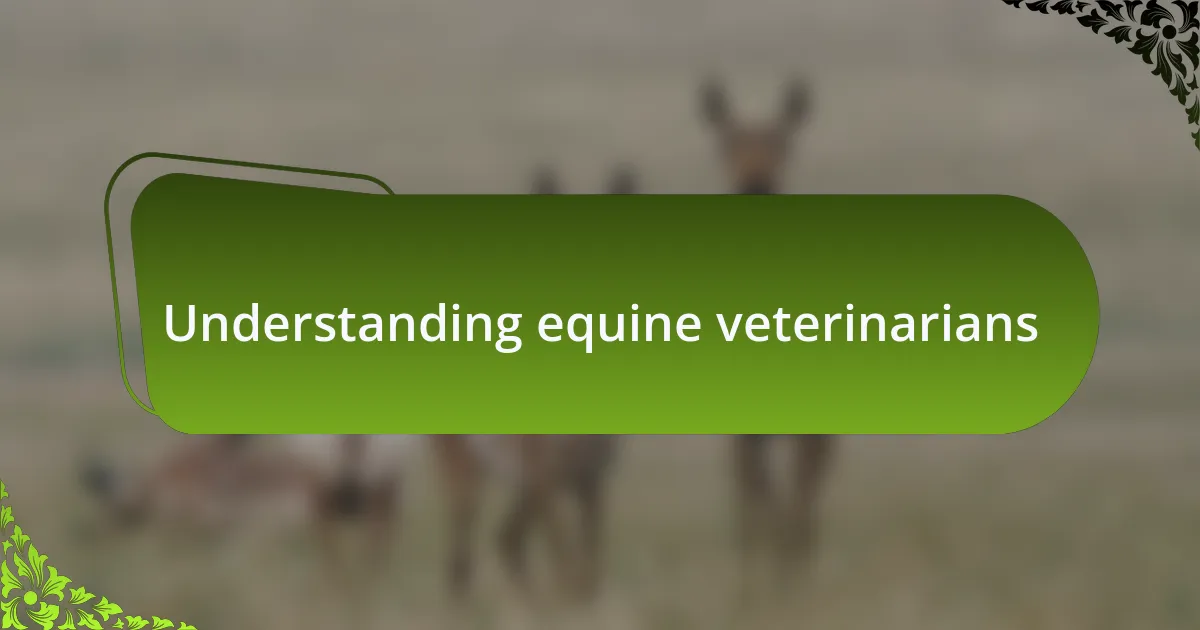
Understanding equine veterinarians
Equine veterinarians are specialists dedicated to the health and well-being of horses, with a comprehensive training that goes beyond general veterinary medicine. When I first started working with my own horses, I had no idea just how extensive their expertise was. I remember watching a vet perform a routine exam and being amazed at their ability to identify underlying issues just by observing my horse’s behavior.
Understanding what makes a good equine veterinarian requires more than just knowledge; it demands compassion and a genuine love for these animals. I once had a veterinarian who took the time to gain my mare’s trust before even examining her. That patience and empathy not only eased my horse’s anxiety but also solidified my confidence in their care. Can you imagine the difference it makes when a vet understands not just the horse’s physical needs but also their emotional ones?
Moreover, equine veterinarians often become partners in our journey as horse owners, guiding us through preventative care, nutrition, and training advice. I recall my veterinarian explaining how nutrition plays a crucial role in maintaining my horse’s performance. This relationship transforms veterinary visits into valuable learning experiences, where I felt empowered with knowledge, instead of merely seeking a service. How can we not appreciate such a profound connection in our equestrian lives?
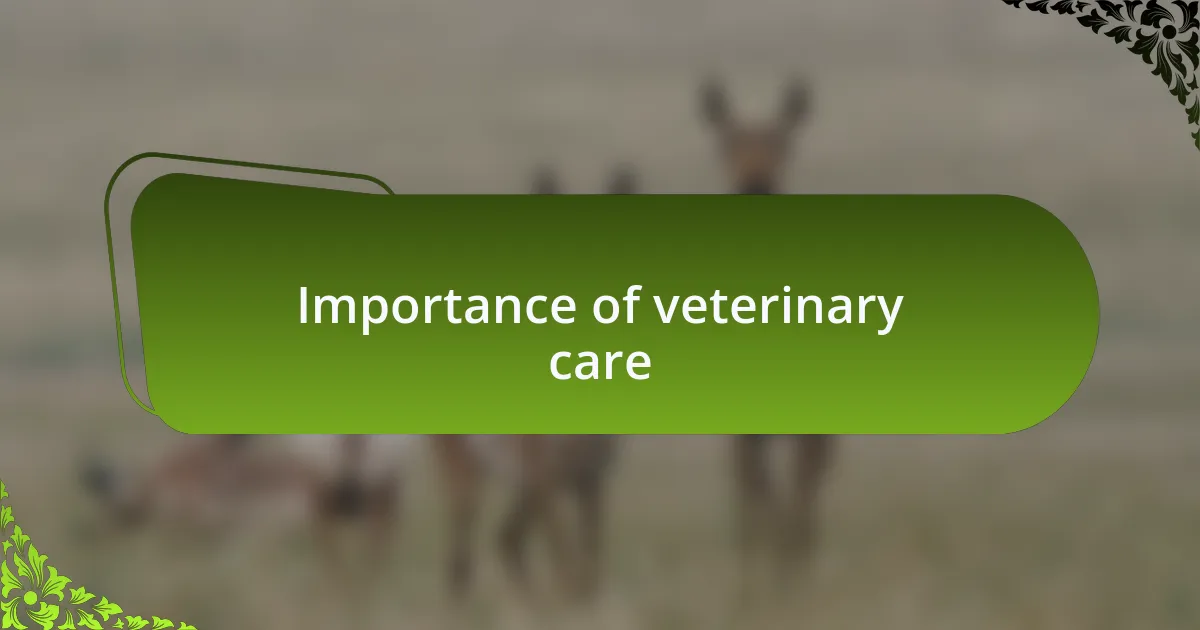
Importance of veterinary care
Veterinary care is fundamental in maintaining a horse’s overall health and preventing diseases. I often think back to a time when one of my horses developed a slight cough. I hesitated to call the vet, thinking it was just a minor issue. However, my veterinarian emphasized that early intervention can make a world of difference. Their expertise not only prevented a potentially serious condition but also saved me significant stress and expense down the road. How often do we downplay signs, believing they are trivial when they might be indicators of something more serious?
Routine check-ups are invaluable for catching issues before they escalate. There was a moment when my vet discovered a dental issue during a regular examination that I would have never noticed. The relief I felt knowing we addressed it early was immense. It’s comforting to realize that these professionals don’t just treat your horse when there’s a problem—they help maintain their health, thereby safeguarding their happiness and performance. Can you imagine the peace of mind that comes from knowing your horse is regularly monitored by a trained expert?
Additionally, the education I receive from my vet during these visits is just as crucial as the medical care itself. One afternoon, as we discussed vaccination schedules and their importance, it struck me how much I valued that knowledge. It empowered me to take proactive steps in caring for my horses. Providing routine care is not just about the veterinary procedures themselves; it’s also about building a resilient partnership centered around our shared love for these magnificent creatures. How reassuring is it to realize that this knowledge supports not only your horse’s well-being but also your confidence as an owner?
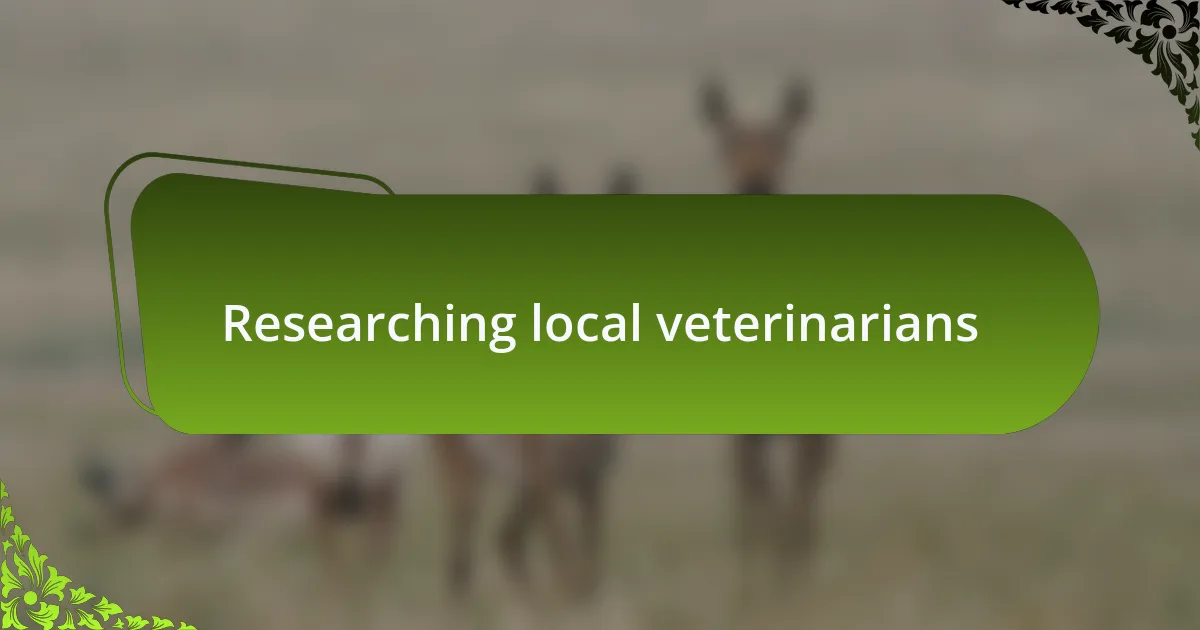
Researching local veterinarians
When I began the search for a local veterinarian, I quickly realized how important it is to gather comprehensive information. I dove into online reviews and local directories, spending time reading other horse owners’ experiences. This gave me insights into the vets’ approaches and specialties—valuable details that shaped my decision-making process.
Visiting potential clinics was another step I found crucial. The atmosphere of a veterinary clinic can tell you a lot. During my first visit to one clinic, I noticed how the staff interacted with both the horses and their owners. Their kindness and professionalism eased my concerns, and it felt good to know I might trust them with my horse’s care. Doesn’t it make a world of difference to feel welcomed and understood when choosing someone to care for your beloved animal?
I also sought recommendations from fellow equestrians; their insights were invaluable. One of my friends shared a story about how her vet went above and beyond during an emergency. Hearing about that level of dedication made me realize how critical it is to find a veterinarian who genuinely cares about their patients. Isn’t it reassuring to know that your veterinarian won’t just treat your horse, but also advocate for their well-being?
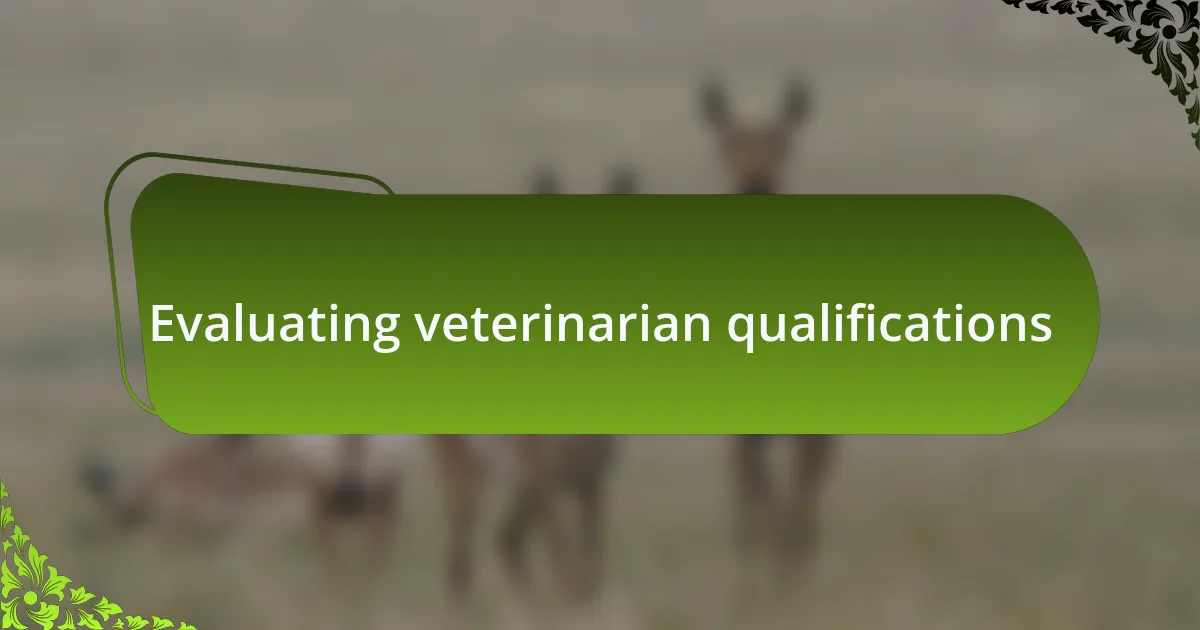
Evaluating veterinarian qualifications
When evaluating veterinarian qualifications, I found it essential to consider their educational background and areas of specialization. For instance, I once visited a vet who had extensive training in equine anatomy and surgery. This specialized knowledge gave me confidence in her ability to handle any potential health issues my horse might face. Have you ever wondered how much knowing a vet’s credentials can affect your peace of mind?
Additionally, I paid close attention to certifications and memberships in professional organizations, like the American Association of Equine Practitioners. These affiliations often indicate a commitment to ongoing education and high-quality care. I remember feeling much more at ease when I discovered my veterinarian actively participated in workshops and seminars. Doesn’t knowing that your vet is continually updating their skills make a significant difference in how you view their expertise?
It’s also worth asking about their experience with specific health concerns or procedures that may be relevant to your horse. I once had a vet who had successfully treated a rare condition that my horse developed. Hearing her share interesting case studies and solutions made me feel confident in her abilities. Isn’t it comforting to know that your vet has hands-on experience with issues that matter most to your horse’s health?
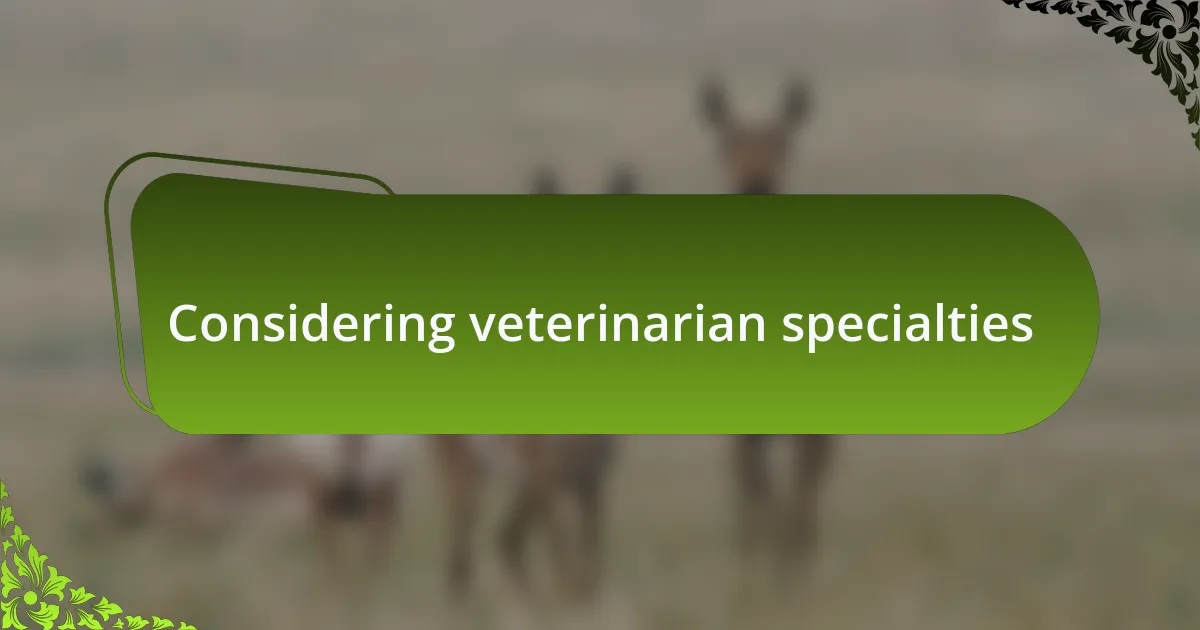
Considering veterinarian specialties
When I began considering my equine veterinarian’s specialties, I quickly realized that not all vets are created equal. For example, I had a horse with chronic lameness, and I learned that consulting a vet specializing in equine sports medicine was a game-changer. They understood not just the anatomy but also the biomechanics involved, which gave me fresh hope for my horse’s recovery.
I once encountered a situation where my horse was diagnosed with colic. After the initial panic, I was grateful that my vet specialized in internal medicine. Their expert analysis and tailored treatment plan alleviated my worries, and I felt like I was in capable hands. Have you ever considered how a vet’s specific focus can drastically impact the care options available? It’s a reminder that specialization can make a significant difference in urgent scenarios.
Moreover, I’ve found that asking my vet about their experiences with particular breeds or conditions can uncover valuable insights. One time, I realized my vet had extensive experience with the breed I owned, leading to customized care recommendations that were spot-on. Doesn’t it feel reassuring to know that someone understands the unique health quirks of your horse’s lineage? This aspect has shaped my decision-making process significantly, guiding me toward a veterinarian who truly understands my horse’s needs.
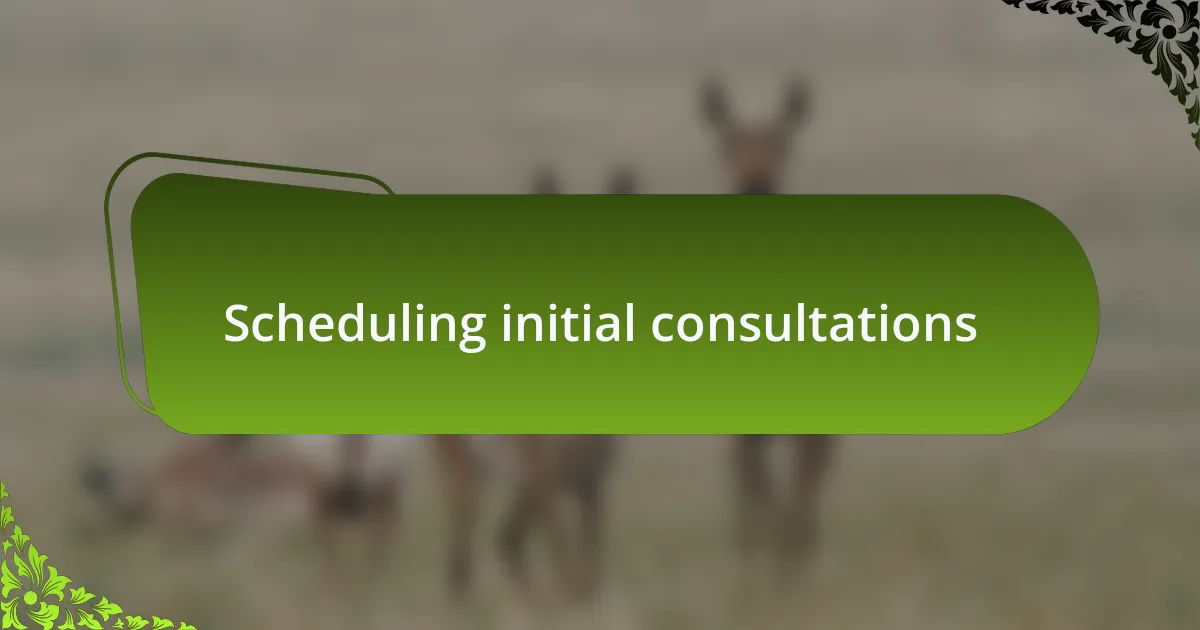
Scheduling initial consultations
Scheduling an initial consultation is often the first step in building a relationship with a new equine veterinarian. I remember feeling a mix of excitement and nervousness when I called to set up my first appointment with a specialist. Making sure to find a time that worked for both the vet and my schedule was crucial; it gave me a sense of commitment toward my horse’s health right from the start.
In my experience, a friendly conversation during the initial call can set the tone for the veterinary relationship. I once encountered a practice where the receptionist took the time to listen and ask questions about my horse’s history. This level of engagement made me feel valued and reassured me that the vet would also prioritize my horse’s individual needs. Isn’t it nice when you feel like you’re more than just another appointment on a calendar?
I’ve learned that flexibility in scheduling can make a big difference, especially in emergencies. I recall a time when I had to reschedule due to an unforeseen situation, and the vet’s office was incredibly accommodating. Their understanding approach made me realize that the vet’s practice ethos matched my own values—after all, isn’t it essential to choose a veterinarian who is as responsive to your horse’s needs as you are?